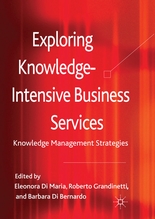Exploring Knowledge-Intensive Business Services
The book includes the articles "KIBS and Knowledge Dynamics is Client–Supplier Interaction" by Ian Miles and "How Knowledge-Intensive Business Services Upgrade their Customers: Evidence from Russia" by Marina Doroshenko.
 The book includes the articles "KIBS and Knowledge Dynamics is Client–Supplier Interaction" by Ian Miles and "How Knowledge-Intensive Business Services Upgrade their Customers: Evidence from Russia" by Marina Doroshenko.
The book includes the articles "KIBS and Knowledge Dynamics is Client–Supplier Interaction" by Ian Miles and "How Knowledge-Intensive Business Services Upgrade their Customers: Evidence from Russia" by Marina Doroshenko.
Exploring Knowledge-Intensive Business Services- is an updated view of knowledge management strategies of knowledge-intensive business services, focusing on how these service firms manage innovation in the framework of the knowledge economy. The authors offer an original analysis of key processes of business services specializing in different activities such as design, professional firms, and information technology. This volume contains rich case studies, surveys and quantitative economic analysis carried out in Canada, France, Germany, India, Italy, Russia and Spain. It gathers contributions from respected scholars specializing in knowledge-intensive business services and offers a fresh overview of the dynamics concerning knowledge management in services, with respect to firms embedded in regional innovation systems, metropolitan areas and clusters.
In "KIBS and Knowledge Dynamics is Client–Supplier Interaction", by I. Miles, the focus is on the learning that can occur in dyadic interchanges between KIBS and clients. KIBS (Knowledge-Intensive Business Services) apply knowledge to support their clients' business processes by providing solutions to problems that the clients are encountering. Producing of this kind of service requires more or less close engagement of the client in terms of supplying domain-specific input information. This could be knowledge about management organisation, information systems, legal affairs, market research, technical testing, or much more. Such knowledge exchange provides opportunities for mutual learning. There are many possible forms of learning, and also many failures to learn are commonly observed. This essay considers both cases of limited learning on the part of clients, and ways in which mutual learning takes place in both KIBS and their clients across the service relationship.
The paper "How Knowledge-Intensive Business Services Upgrade their Customers: Evidence from Russia" by M. Doroshenko provides in-depth study of interaction between KIBS suppliers and customers. It presents the interaction as the process of mutual learning via co-production. The upgrade of KIBS consumers through their participation in co-production is supported by evidence obtained via original surveys of Russian KIBS producing and consuming companies.

